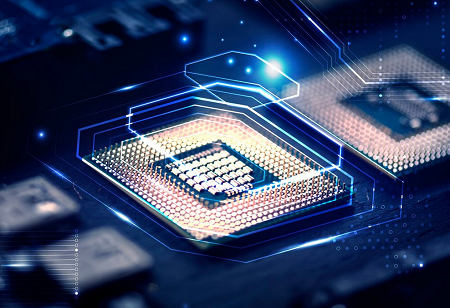
The Government of India is now reviewing proposals totaling USD 21 Billion in investments which are aimed at fostering chip manufacturing in India. The proposals comprise of various ventures from both international as well as domestic conglomerates. While Tata Group has presented an $8 billion plan for a manufacturing unit for chip in Gujarat, Tower Semiconductor Ltd, Israel is proposing a $9 billion plant intending to establish a semiconductor plant in the same region.
According to a source, the Israel Company - Tower semiconductor aims to scale up a plant over a decade for eventually manufacturing eighty thousand silicon wafers per month. If this is approved, then this will be the 1st fabrication unit in the country that is operated by a major semiconductor company. The Indian government is looking forward to positioning the country as one of the global manufacturing hub by utilizing incentives in order to attract chip manufacturers while helping the growth of local chip manufacturers.
With their huge significance across several sectors right from aerospace to automobiles semiconductors act as the linchpin of a modern technological segment. Some of the Chip manufacturing companies in India include Tata Elxsi, Moschip Technologies, Dixon Technologies, SPEL Semiconductor, ASM Technologies, and others. Semiconductors not only have a positive impact on the economic growth of a country but they also make way for an interconnected world. In this article let us look at the various factors that would help in fueling the growth of the chip manufacturing industry in the country.
Industry 4.0 and Smart factories
While industry 4.0 depicts the 4th industrial revolution that is powered by smart factories which are capable of automating the manufacturing processes either with little or no human intervention, it is important for machines for manufacturing semiconductors to merge advanced technologies as well as features that include big data, Internet of Things, machine learning, AR etc. Furthermore, the machines can talk to each other in order to optimize the manufacturing process or stop the progress in the event of any process irregularity.
A major technological element of Industry 4.0 is 3D printing. While the traditional machine cuts the pieces from a huge block of raw material to produce a design, 3D printing/additive manufacturing is purely based out of laser printing which performs the right opposite of traditional printing. Additive manufacturing utilizes powdered metal for building layers of substrates until the exact shaped required by the client is achieved. And hence there is absolutely no place for wastage of material since the whole process runs through utilizing computer programs. Furthermore, manufacturers can achieve speed in production process through utilizing prototyping.
“India has been highly reliant on imports to meet its semiconductor requirements. But with the boost in manufacturing because of Made in India campaign by govt. of India, there has been growth in the demand for SoC - ASIC and FPGA design and verification services,” says Isha Joshi, MD of G7N Semiconductors.
5G Smart Devices
The pandemic has prioritized online business radically and hence the market is seeing a advancement in 5G technology. 5G is 5 to 10x faster when compared to 4G. Semiconductor manufacturing have already seen a surge in demand for powering up 5G smartphones. Semiconductor manufacturing has already witnessed a considerable surge in demand for powering up 5G smartphones owing to increase in 5G deployments. These new smartphones need 5G compatible chips in order to achieve wave connectivity of super-fast 5G mm. The manufacturing of 5G smartphones has recently gone high by 45.3 per cent as per a recent report by Gartner.
“Due to the Semiconductor Chip’s role is an essential component of electronic devices, enabling advances in communications, computing, healthcare, military systems, transportation, automobiles, clean energy and countless other applications, semiconductors have become an important part of our lives,” says Paul Kaunds, Founder & CEO, P&C Tech Consultant.
“In recent years the Indian Government has launched several programs and initiatives to improve its semiconductor footprint. To realize this burgeoning demand of semiconductors, India needs skilled and qualified electronic engineers and specialized experienced workforce in semiconductor design,” he adds.
Automotive industry recovery
Today, semiconductors are the center of the automotive sector. A lot of the advanced features in the automotives today like airbag deployment, anti-lock brake system & digital meter display etc are possible owing to vehicle microelectronics & semiconductors.
For instance, today’s modern electric cars comprise over hundred ECUs, which are run using a hundred million lines of program. Also, semiconductors facilitate in powering up the important sensors that are dedicated to power, fuel, acceleration, proximity, pressure and others. Although there is surge in demand for semiconductors, the supply of these products is supposed to be a matter of worry.
One such company that manufactures high performance Systems on Chips for EVs, health monitoring equipment as well as connected devices/gadgets is Chennai based Mindgrove Technologies. This company was founded by Shashwath T R & Sharan J. Mindgrove is backed by Peak XV Partners, Special Invest & Whiteboard Capital.
The semiconductor sector is set to face challenges continuously that include IP thefts, skilled talent shortages, supply chain disruptions and cybersecurity threats. Therefore, it is important to address these issues for witnessing a continued growth & stability. While several nations are coming up with strategies to go ahead in the semiconductor race, only time will decide which nations will come out as winners. However, all the other sectors and customers will definitely get benefitted from the speed of development as well as innovation in the long run.
We use cookies to ensure you get the best experience on our website. Read more...